- Aug 24, 2025
- 3 min read
Updated: Nov 24, 2025
IMMIGRANTS IN EUROPE’S NORTH (Part 1)*
Europe’s Nordic nations still view immigration positively, but with some reservations
A summary compiled by The Immigrant Times

Immigrants in Sweden have largely been welcomed, but the 2015/16 influx has somewhat strained public goodwill (Photo: Janerik Henriksson)
August 2025: The three Scandinavian nations, Denmark, Sweden and Norway, as well as Finland, are historically viewed as progressive and liberal countries that value broad social responsibility. Yet when it comes to public attitudes toward immigrants, these neighbouring countries reveal some contrasts, shaped by history, policy, and cultural narratives.
Despite shared geography and governance models, the Nordic countries diverge sharply in how they perceive and integrate immigrants. Sweden and Norway lean toward inclusion, Denmark toward restriction, and Finland toward cautious pragmatism. These differences reflect not just policy choices, but deeper cultural narratives about identity, belonging, and the role of migration in shaping the future.
Sweden
Sweden has long positioned itself as a humanitarian leader, welcoming refugees and migrants with generous policies. Nearly 20 per cent of its population is foreign-born, one of the highest rates in Europe. Public sentiment has generally leaned positive. Some 63 per cent of Swedes in 2018 believed immigrants make the country better. However, the 2015 to 2016 refugee influx strained public confidence, sparking debates around crime, integration, and national identity. While attitudes have moderated since, concerns persist, particularly around security and social cohesion.
Norway
Norwegians exhibit some of the most favourable views toward immigrants in the region. A 2024 survey found that 87 per cent believe immigrants contribute positively to the workforce. Cultural diversity is broadly accepted, and forced assimilation is widely rejected. Yet attitudes dipped slightly in 2024, returning to pre-Ukraine war levels. Urban contact with immigrants tends to foster more inclusive views, while rural areas remain more sceptical. Education, age, and gender also play a role. Women and younger Norwegians are notably more welcoming.
Denmark
Denmark’s immigration debate is deeply polarised. While roughly half the population sees immigration as beneficial, political rhetoric, across both left and right, has grown increasingly negative. The country enforces some of Europe’s strictest immigration laws, including deterrence-based asylum policies and symbolic measures like relocating asylum seekers to remote areas. Public narratives often link immigration to crime and threats to Danish culture, reinforcing a climate of suspicion. Yet beneath the surface, there’s a growing civil society push for more humane approaches.
Finland
Finland’s public attitudes are more reserved, often tinged with scepticism. While immigrants report high levels of welfare access, they also face significant social barriers. Some 42 per cent say they experienced discrimination in the past year, with loneliness and exclusion especially acute among men from Africa and the Middle East. Experts urge a shift from viewing migrants as labour units to recognising them as future citizens.
Sources
European Social Survey (ESS). The Survey offers comparative data on public attitudes toward immigration across Europe, including the Nordic countries. The research includes insights into perceptions of economic, cultural and security impacts.
Scandinavian Responses to Immigration. A comparative policy analysis of Denmark, Norway, and Sweden’s approaches to immigration and multiculturalism.
Statistics Norway Report (SSB). The report provides detailed migration and integration data for Denmark, Finland, Norway and Sweden from 2026 to 2022. It covers education, employment and demographic trends.
* Part 1 describes the local population’s attitude to immigration. Part 2 will look at the immigrants’ view of their host countries.
Further reading: Housing asylum seekers in Europe {{ Denmark’s immigration model: What Britain should use and what it should not || Migration and public safety ||
FOLLOW
